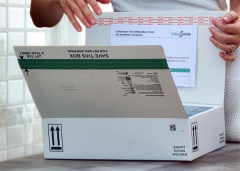
ColonSense box being opened by patient
ColoSense
James Van Der Beek, of Dawson’s Creek, revealed he was diagnosed with stage 3 colon cancer at 47, after already experiencing symptoms. As a physician, I see too often that warning symptoms for colon cancer—like rectal bleeding, changes in stool, weight loss, or abdominal pain—go unrecognized as concerning. Worse, many people do not know the recommended screening age was lowered from 50 to 45 in 2021, an update that added 19 million people to the eligible screening pool. Van Der Beek’s openness serves as a generous reminder of the importance of recognizing symptoms and getting screened early.
And while colonoscopy remains the gold standard for prevention, it’s not always accessible. That’s why new noninvasive screening tools, like the recently FDA-approved ColoSense, are being developed to expand access. Here’s why non-invasive screening for colon cancer is on the rise.
Colon Cancer Is A Growing Health Care Crisis
Colon cancer, also called colorectal cancer, is found in the colon and rectum of the large intestine. Data shows colon cancer rates have been increasing in adults under age 50 by 1-2% per year since the 1990s. In my clinical practice alone, I now frequently encounter individuals in their 20s and 30s with advanced stage colon cancer. The lowest common denominator for many of these cases is lack of awareness. They were unaware of colon cancer symptoms, their risk factors, or the recommended screening age for routine colonoscopy. Or, when symptoms were raised by patients, they were ignored by a physician who was unaware of this growing trend.
Education, for patients and physicians, is critical to slowing the rise in colon cancer rates. Yet awareness alone is not enough—patients also need access. And right now, access is constrained.
The Capacity Challenge With Colonoscopies
Photo of Dr. Erica Parnell
ColoSense
Co-founder and Chief Medical and Science Officer of Geneoscopy, Dr. Erica Barnell, explains, “With the new, lowered age threshold for screening, millions more patients now qualify, but there aren’t enough gastroenterologists or colonoscopy slots to meet the increased demand.”
Currently, an estimated 44 million people in the United States are eligible for colon cancer screening. Yet the physician workforce is limited: only about 17,000 gastroenterologists treat adult patients, and over half those physicians are age 55 or older. Compounding the problem, colon cancer is increasingly diagnosed before age 45. Some policymakers have even proposed lowering the recommended screening age to 35—a well-intended change that could further strain an already overwhelmed system.
To improve access to screening and decrease the workload of colonoscopies, Geneoscopy developed ColoSense, a noninvasive screening option that detects colon cancer and precancerous lesions through a stool sample. ColoSense was approved by the FDA in May 2024, and is among the newest noninvasive screening options for average risk patients. Unlike methylation-based stool DNA tests, ColoSense uses RNA biomarkers to detect cancer and precancerous signals.
In a large pivotal trial, the RNA-based stool test detected 93% of colorectal cancers and 45% of advanced adenomas (precancerous lesions), while correctly identifying people without lesions 88% of the time. Compared with the fecal immunochemical test (FIT), it showed notably higher sensitivity for both cancers (93% vs. 78%) and precancerous growths (45% vs. 29%). Barnell adds that, “ColoSense showed strong sensitivity across all age groups.”
How ColoSense Streamlines Colon Cancer Screening
ColoSense delivered to a patients front door
ColoSense
ColoSense is designed for patient comfort and convenience. Unlike other stool tests that require scraping or special handling of your stool, Colosense simplifies sample collection. Once stool is collected, the kit can be easily returned via FedEx to a designated laboratory and the results of the test will be shared with you and your clinician.
Importantly, Colosense is positioned to complement, not replace, a colonoscopy. Patients who test positive still need colonoscopy for confirmation and polyp removal. But by identifying those who most need





